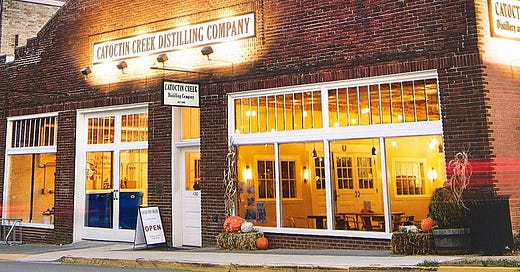Whiskey Business: How Monopolies Mess With The Craft Beverage Boom
My hometown distiller Catoctin Creek's spirited support, and "rye"-valry with big distributors
A couple of weeks ago, I attended a breakfast with my U.S. Senator, Tim Kaine, in Winchester, VA, about 20 miles from my hometown of Purcellville. While Senator Kaine began with discussions of the Presidential election, the small discussion with ~20 people seemed fitting, given the topic most of the crowd wanted to discuss: local businesses, their growth, and the challenges they face.
Senator Kaine has typically taken a pragmatic, grounded approach to politics, and was talking through the twin issues that most Virginia towns face—success for their local businesses, and attainable housing for people who live there. As he talked, Becky Harris, the co-founder of Catoctin Creek Distillery, a pride of Purcellville, nodded in agreement.
Catoctin Creek is awesome. As one of the first legal distilleries in the state since Prohibition, Becky and her husband, Scott, have played a pioneering role in the brewery/winery/distillery movement in Virginia. Becky and Scott built their business on Virginia's rich history of rye whiskey, using local grains and promoting sustainability.
From politicians to economic development champions, Virginia leaders will applaud the growth of Virginia’s beer, wine, and spirits industry. As of 2023, the industry supports over 25,000 jobs across breweries, wineries, and distilleries, generating more than $1.4 billion in revenue annually. In contrast, coal mining, once a cornerstone of Virginia’s economy, has sharply declined, accounting for fewer than 2,700 jobs in 2022. Similarly, the tobacco industry, historically one of Virginia’s largest employers, has seen a steady reduction, now employing fewer than 2,000 people statewide. While tobacco and coal once dominated, the craft beverage industry has surpassed them in job creation and economic impact. This shift also highlights the state's transition from traditional industries to more tourism-driven, locally focused sectors, especially in regions like Loudoun County and the area around Charlottesville.
And these businesses are succeeding not just locally, but on a national and global scale. Catoctin Creek is Virginia’s most awarded whiskey, regularly scoring 90+ points in global magazines. As another example, my friend Jean Case founded Early Mountain Vineyards with her husband Steve. When Jean took Early Mountain over, Virginia wineries were awesome places to visit but the wine wasn’t necessarily competitive. Early Mountain has produced multiple award-winning wines and yesterday, their chief winemaker was named one of the top 5 winemakers in the country. These breweries, wineries, and distilleries are not only significant job drivers but there is also a “flight” to quality (excuse the pun).
Early Mountain is one of the hundreds of wineries that is creating jobs and great experiences in Virginia towns.
Becky raised her hand to speak, and it was obvious she was someone Senator Kaine knew and respected. “Becky,” he said, “thank you for making Catoctin Creek—as you know, your rye is my favorite go-to.”* (He’s telling the truth: I was once at a dinner with Senator Kaine and he expressed disappointment that Jack Daniels was the only option for the whiskey-based drink he wanted.)
"Senator, I appreciate everything you've done for small businesses like ours, especially in Virginia," Becky said. "But there’s a massive roadblock we’re facing, and it's coming from the distribution companies. We’ve grown our distillery from just the two of us to a team of over 20 employees. We’re producing tens of thousands of cases of whiskey a year now, and we’re proud of that growth. But when we try to expand into other states, or even sell in Virginia, we are running into distribution problems. It is actually easier for us to sell into the UK than it is into the US at this point. What are you going to do about the distribution monopoly?”
The craft beverage boom is not just a Virginia phenomenon. According to data from the Brewers Association, the number of breweries in the U.S. has surged from 2,000 in 2012 to over 9,000 in 2022, providing jobs for over 500,000 people. Distilleries, too, have followed a similar path. Between 2015 and 2022, the number of craft distilleries in the U.S. grew by more than 300%, contributing billions to the economy, and creating thousands of jobs in both rural and urban areas.
But with this rapid growth comes challenges. What Becky was upset about is a three-tier system we have in the U.S. for alcohol distribution:
Producers like Catoctin Creek and Early Mountain;
Distributors (these are largely very successful companies you’ve likely never heard of. As an example, Southern Glazer’s Wine & Spirits is the largest wine and spirits distributor in North America, headquartered in Miami, Florida. The company operates in 44 U.S. states, the District of Columbia, and Canada, generating over $21 billion in annual revenue, with a workforce of more than 20,000 employees.)
And retailers (either state controlled, like the Virginia ABC store, or grocers/liquor stores/convenience stores).
This three-tier system was put in place Prohibition to prevent monopolies. However, in practice, it’s the distributors who often have the most power. The three-tier structure gives distributors immense control over which products reach store shelves and bars. Southern Glazer and its peers often exercise that power to the detriment of the producers.
"We’ve been told multiple times by distributors that if we want to be in certain markets, we have to ‘pay to play,’" Becky said. "That means paying fees upfront just to be considered for shelf space, and even then, we’re competing against brands that have far more capital than we do. And then the prices they mandate cut into our margins. Everyone calls us a success, but the business is facing challenges that are killing us."
Senator Kaine frowned. "That sounds like a serious issue, Becky. It’s anti-competitive at its core." He asked Becky to follow up offline to see how he could help.
Fortunately, there are a great deal of people working on this issue. About seven years ago, I wrote a piece, “Monopolies are Killing America,” with my friend Ben Wrobel, highlighting the issues that groups like Southern Glazer are causing for entrepreneurs like Becky, and pointing out an emerging group of solutions. Since then, efforts to support entrepreneurs like Becky have gone much more mainstream.
Indeed, anti-competitive behavior in alcohol distribution is something that’s caught the attention of the Federal Trade Commission (FTC). The Department of Justice’s Antitrust Division and the FTC have already started paying closer attention to monopolistic practices across multiple industries, and alcohol distribution could be next on their radar. Southern Glazer’s, with its near-monopoly in some states, could face a significant lawsuit under antitrust laws.
The grounds for the lawsuit is an existing law on the books that enables businesses to control pricing. The Robinson-Patman Act basically says that Southern Glazer can’t tell Catoctin Creek what to charge, or pay to play; Becky gets to decide. It’s been on the books for over 50 years but is only recently enforced.
If successful, such a case could open up the market for smaller players like Catoctin Creek, allowing them to compete on a more level playing field. The FTC is reportedly preparing a lawsuit against Southern Glazer that would speak to Becky’s concerns directly.
Businesses like Catoctin Creek and Early Mountain provide not just jobs but a sense of identity and community. For entrepreneurs like Becky, competing on a level playing field is crucial to preserving their independence, protecting their margins, and ensuring their products reach the market on their own terms. And I guarantee the success of Catoctin Creek is meaningful to Purcellville; the success of Early Mountain is meaningful to Madison, VA; and we see this story over and over again.
*I’m paraphrasing this conversation—Becky or Senator Kaine, if you’re reading this, hopefully I’ve relayed the content faithfully)





